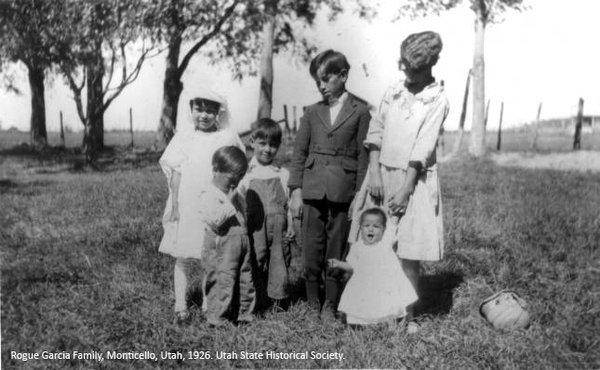Dublin Core
Title
Description
In 1899, Ramon Gonzalez, his wife Guadalupe, and his children Romana and Prudencio, left their home in Dixon, New Mexico, to settle in Monticello, Utah. A wagon carried all their household possessions, while a few head of livestock followed on the hoof.
When the family reached Durango, Colorado, Ramon caught wind of a severe drought around Monticello and decided to winter in the Colorado town. It wasn’t until the following March that the Gonzalez family pulled into San Juan County and began the process of carving out a homestead on a plot of land near Indian Creek.
Unfortunately, Ramon died two short years after his arrival in the Monticello area, and was buried in the non-Mormon section of the cemetery. But his experiences, and those of other early Hispanic pioneers, opened the way for new waves of Spanish-speaking migration into areas around San Juan County including Spring Creek, Carlisle, and La Vega.
According to scholars William Gonzalez and Genaro Padilla, by 1920, the Spanish-speaking population of Monticello had grown large enough to give rise to several distinctly Hispanic neighborhoods. What is more, Monticello had become the gateway for the migration of many more Hispanos into other areas of Utah. Families who bear the names of San Juan County’s pioneering Hispanic settlers—Gonzalez, Garcia, Jaramillo—still live in or near Monticello. And Ramon Gonzalez is still remembered, his name forever memorialized as one of the first Hispanos to put down permanent roots in Utah.
Creator
Brandon Johnson for the Utah Humanities © 2008
Source
See William H. Gonzalez and Genaro Padilla, “Monticello, The Hispanic Cultural Gateway to Utah,” in John S. McCormick and John R. Sillito, ed., A World We Thought We Knew: Readings in Utah History (Salt Lake City: University of Utah Press, 1995).
Publisher
The Beehive Archive is a production of the Utah Humanities Council. Find sources and the whole collection of past episodes at www.utahhumanities.org

